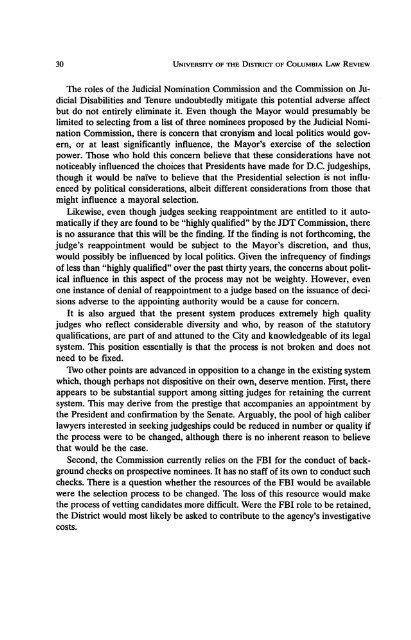Download Electronic Version - UDC Law Review
Download Electronic Version - UDC Law Review
Download Electronic Version - UDC Law Review
You also want an ePaper? Increase the reach of your titles
YUMPU automatically turns print PDFs into web optimized ePapers that Google loves.
30 UNIVERSITY OF THE DISTRlcr OF CoLUMBIA LAW REVIEW<br />
The roles of the Judicial Nomination Commission and the Commission on Judicial<br />
Disabilities and Tenure undoubtedly mitigate this potential adverse affect<br />
but do not entirely eliminate it. Even though the Mayor would presumably be<br />
limited to selecting from a list of three nominees proposed by the Judicial Nomination<br />
Commission, there is concern that cronyism and local politics would govern,<br />
or at least significantly influence, the Mayor's exercise of the selection<br />
power. Those who hold this concern believe that these considerations have not<br />
noticeably influenced the choices that Presidents have made for D.C. judgeships,<br />
though it would be nai've to believe that the Presidential selection is not influenced<br />
by political considerations, albeit different considerations from those that<br />
might influence a mayoral selection.<br />
Likewise, even though judges seeking reappointment are entitled to it automatically<br />
if they are found to be "highly qualified" by the JDT Commission, there<br />
is no assurance that this will be the finding. If the finding is not forthcoming, the<br />
judge's reappointment would be subject to the Mayor's discretion, and thus,<br />
would possibly be influenced by local politics. Given the infrequency of findings<br />
of less than "highly qualified" over the past thirty years, the concerns about political<br />
influence in this aspect of the process may not be weighty. However, even<br />
one instance of denial of reappointment to a judge based on the issuance of decisions<br />
adverse to the appointing authority would be a cause for concern.<br />
It is also argued that the present system produces extremely high quality<br />
judges who reflect considerable diversity and who, by reason of the statutory<br />
qualifications, are part of and attuned to the City and knowledgeable of its legal<br />
system. This position essentially is that the process is not broken and does not<br />
need to be fixed.<br />
Two other points are advanced in opposition to a change in the existing system<br />
which, though perhaps not dispositive on their own, deserve mention. First, there<br />
appears to be substantial support among sitting judges for retaining the current<br />
system. This may derive from the prestige that accompanies an appointment by<br />
the President and confirmation by the Senate. Arguably, the pool of high caliber<br />
lawyers interested in seeking judgeships could be reduced in number or quality if<br />
the process were to be changed, although there is no inherent reason to believe<br />
that would be the case.<br />
Second, the Commission currently relies on the FBI for the conduct of background<br />
checks on prospective nominees. It has no staff of its own to conduct such<br />
checks. There is a question whether the resources of the FBI would be available<br />
were the selection process to be changed. The loss of this resource would make<br />
the process of vetting candidates more difficult. Were the FBI role to be retained,<br />
the District would most likely be asked to contribute to the agency's investigative<br />
costs.














